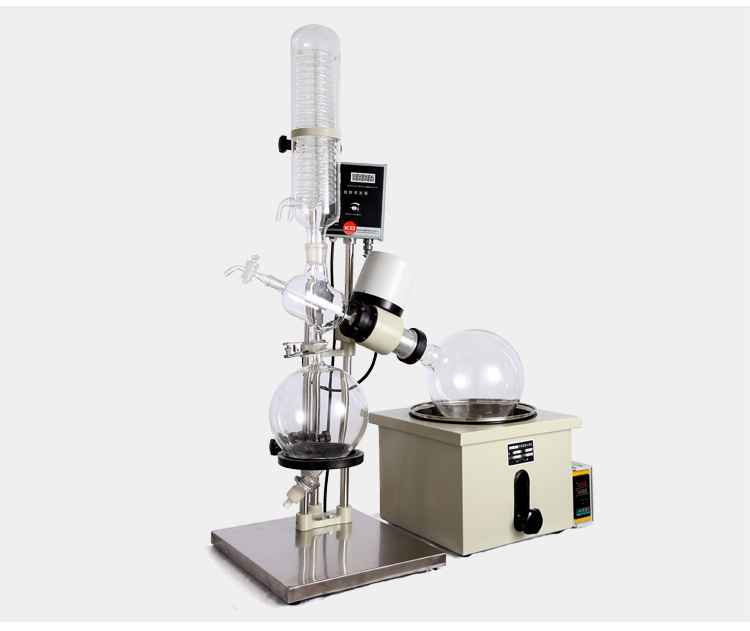Rotary evaporator vs simple distillation
We have 1L rotary evaporator N-1100D and 5L rotary evaporator RE-501 on sale. They are all made of 304, 316 stainless steel and high borosilicate glass, with reasonable structure, strong and durable.
1. Rotary evaporator and ordinary distillation have different distillation speeds
When the rotary evaporator performs distillation, because the evaporation surface area of the solution is large, the evaporation speed is fast.
Ordinary distillation can not evaporate a large area, so the evaporation rate is relatively slow.
2. Rotary evaporator and ordinary distillation have different uses
Rotary evaporators are generally used for extraction and concentration of CBD, pharmaceuticals, chemistry, and laboratories, so that materials can be distilled and extracted in a closed vacuum environment.
Ordinary distillation is generally used for the drying treatment of easily decomposable materials.
3. The structure of rotary evaporator and ordinary distillation is different
The rotary evaporator is composed of a motor, a distillation flask, a heating pot, and a condenser tube.
The vacuum distillation device system includes three parts: distillation, pumping, and protection and pressure measuring devices between them. The whole set of instruments must use round thick-walled instruments. Otherwise, accidents such as explosion may occur due to uneven force.
4. The working principle of rotary evaporator and ordinary distillation are different
Principle of Rotary Evaporator
Through electronic control, the flask is rotated at a constant speed at the most suitable speed to increase the evaporation area. The evaporation flask is under negative pressure by means of a vacuum pump. The evaporation flask is placed in a water bath for constant temperature heating while rotating, and the solution in the bottle is heated, diffused and evaporated in the rotating flask under negative pressure.
The rotary evaporator system can be sealed and reduced to 400-600 mmHg; the solvent in the distillation flask is heated with a heating bath, and the heating temperature can be close to the boiling point of the solvent; it can also be rotated at a speed of 50-160 rpm, Make the solvent form a thin film to increase the evaporation area.
In addition, under the action of a high-efficiency cooler, the hot vapor can be quickly liquefied to accelerate the evaporation rate. To
Principle of ordinary distillation
The boiling point of a liquid refers to the temperature at which its vapor pressure is equal to the outside atmospheric pressure. The boiling point of a compound always changes with the external pressure. When some compounds with a higher boiling point (above 200℃) are distilled under normal pressure, due to the increase in temperature, they tend to decompose, oxidize or polymerize before reaching the boiling point. And other phenomena. At this time, atmospheric distillation cannot be used, but vacuum distillation should be used.
By reducing the pressure in the system and lowering the boiling point of the liquid, these phenomena can be avoided. When the pressure of many organic compounds is reduced to 1.3-2.0kPa (10-15mmHg), the boiling point can be lowered by 80℃-100℃ than its normal pressure. Therefore, vacuum distillation is of great significance for separating or purifying liquid organic compounds with high boiling points or unstable properties.
In general, the rotary evaporator is suitable for concentration, and ordinary vacuum distillation is used for purification. Rotary evaporators are generally used for the extraction and concentration of solid medicines, and ordinary vacuum distillation is mostly used for drying treatment of easily decomposable liquid medicines. Ordinary vacuum distillation is suitable for industrialized large-scale production, and the rotary evaporator is suitable for chemical laboratories.


